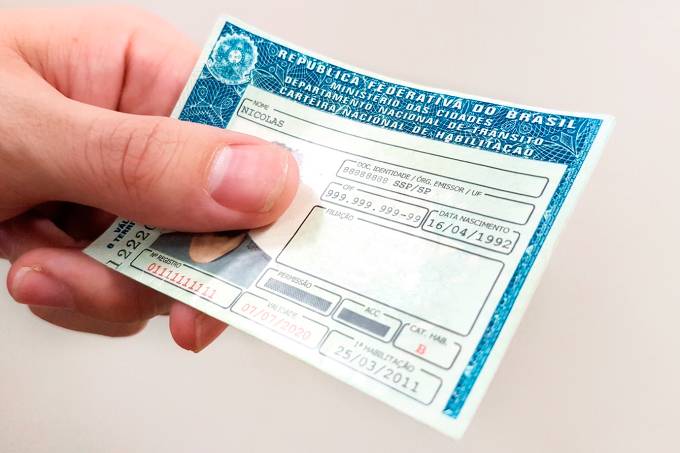RIO DE JANEIRO, BRAZIL – On Tuesday, the Chamber of Deputies passed the bill that extends the driver’s license renewal period from five to ten years. Personally presented by President Jair Bolsonaro last year, the bill was controversial because it suggested legal changes that could encourage infractions and traffic accidents. The rules were tightened both by deputies and senators. Now, the text proceeds to presidential sanction.
The bill began processing in the Chamber but was changed by the Senate. In its second review by deputies, rapporteur Juscelino Filho welcomed the main change. Senators included a ban on substitution of fines for prison sentences in the event of a serious accident caused by a driver under the influence of alcohol or a psychoactive substance. This was the current rule, but deputies had eased the penalty during the first review of the text.

“The Senate’s decision is a change in the punitive system structure for traffic crimes, which seeks to discontinue the feeling of impunity for these crimes when they involve the consumption of alcohol or narcotic substances,” said the legislator in plenary, when reading the report.
On the other hand, the deputy rejected a rule included in the Senate that prohibited the transportation of alcoholic beverages in unsealed packaging.
“There is not necessarily a cause and effect relationship between the transport of open alcoholic beverages and their consumption by the driver, as in many cases it could be ingested by the passenger, or simply carried,” Juscelino justified, rejecting an amendment added by the Senate.
One of Bolsonaro’s partial victories was the extension of deadlines for driver’s license renewal from five to ten years, with the requirement of physical and mental fitness exams. The government wanted the extended term to apply to drivers up to 65 years of age. However, legislators and senators decided to apply different terms.
Drivers up to 50 years of age will have their license renewed for ten years, drivers between 50 and 70 years of age for five years, and those over 70 years of age for three years.
The proposal also changes the number of points required for suspending the license. At the start of the process, the government wanted to increase the limit from 20 to 40 before the transgressor would have his/her license canceled. The measure, as suggested, was ultimately rejected by deputies and senators. But there was a change in the current rule.
In the event of a conviction of two or more very serious infractions, drivers will have their license suspended. In the case of only one very serious violation, they will be prevented from driving when reaching 30 points. And if there are no very serious violations among the fines, drivers will be able to accumulate 40 points.
The main points of the bill:
Driver’s license suspension
Currently, licenses are suspended when drivers accumulate 20 points for traffic violations over a 12-month period. According to the bill, with this same score, drivers may have their license revoked if they have two or more very serious violations. In the case of only one very serious violation, they will be prevented from driving when reaching 30 points. And if there are no very serious violations among the fines, drivers will be able to accumulate 40 points, regardless of the gravity of the violation.
Driver’s license renewal
The bill stipulates a period of ten years for renewing the driver’s license for drivers under 50 years of age; five years for drivers aged 50 or over and under 70 years of age; and three years for drivers aged 70 or over. Under the current rule, the renewal period is five years, even for younger drivers. According to the bill, the term for professional drivers is five years for those under the age of 70 and three years for those over the age of 70.
Obligatory child safety seat
The bill presented by Bolsonaro abolished the mandatory child safety seat. However, the approved bill was drafted differently. Children up to ten years of age who have not yet reached a height of one meter and 45 centimeters may only ride in vehicles with the car seat suitable for their weight.
The penalty currently provided in the Traffic Code for non-compliance with this requirement has been preserved: a fine corresponding to a very serious violation. Furthermore, the age for children to be allowed on motorcycles has been increased: only over the age of ten.
Toxicological tests
Bolsonaro’s proposal to end the mandatory broad screening for drivers of vehicles in categories C, D, and E – heavy trucks and buses – was rejected. The current legislation was upheld.
Psychological evaluation
Deputies included the requirement for psychological evaluation in cases where drivers have caused serious accidents. The exam will also be required in cases where drivers have been convicted of a traffic violation or are endangering traffic safety, by decision of the traffic authority.
National Traffic Council
The body may only edit rules provided that minutes on the regulated subject are previously submitted to public consultation.
Administrative violation
Administrative violations will no longer be considered when scoring drivers’ licenses. A fine will be levied, although it has no impact on the suspension of the document. Such violations are, for instance, holding a vehicle license plate, which does not comply with specifications or driving a vehicle, which does not carry the required documents.
Positive Register
The bill introduces the National Positive Drivers Register (RNPC), which should contain data on drivers who have not committed any traffic violation within one year. The goal is to reward and encourage good drivers with raffles that will be funded by one percent of the National Traffic Safety and Education Fund (FUNSET). The register will also provide drivers with tax and fare benefits.
Source: O Globo

